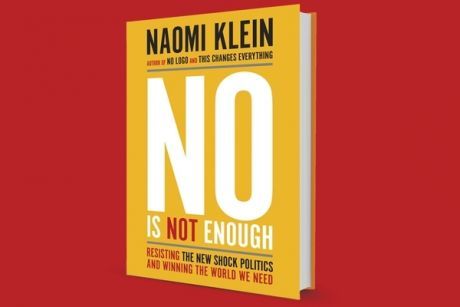Arts
You are here
Review: the anti-Trump guide

June 19, 2017
Who better than Naomi Klein to write a book about the rise of Donald Trump and how to resist?
Her book No Logo: rise of the brand bullies was a guide for the anti-globalization movement 17 years ago; The Shock Doctrine: the Rise of Disaster Capitalism expressed the radicalization against neoliberal catastrophes unleashed from New Orleans to Baghdad a decade ago; This Changes Everything: Capitalism vs the Climate articulated the climate justice movement a few years ago, and her role in the Leap Manifesto continues to encourage organizing. These insights, reflecting and building resistance movements over more than a decade and a half, help to explain the rise of Trump and how to resist.
Brand bully and disaster capitalist
As she explains, Trump is the “proto-disaster capitalist” who “seized on New York’s economic catastrophe to boost his own fortune”. He has become the “ultimate brand bully”, “the personification of the merger of humans and corporations—a one-man megabrand… the embodiment of the belief that money and power provide licence to impose one’s will on others, whether that entitlement is expressed by grabbing women or grabbing the finite resources from a planet on the cusp of catastrophic warming.”
In the context of Black Lives Matter, protests against rape culture and growing movements for Indigenous sovereignty and climate justice, Trump represents a “ferocious backlash against the rising power of overlapping social and political movements demanding a more just and safer world.” His election was “like a Bat-Signal for hatemongers of all kinds,” unleashing violence on racialized communities. He has installed a “disaster capitalist cabinet” filled with oil executives profiting from a melting Arctic, defence contractors profiting from war, and financial executives profiting from deregulation.
As Klein warns, we need some “disaster preparedness” to resist the shocks that could come: a terror attack could be used to further target oppressed communities and round up organizers, financial deregulation could spell more economic disasters and a two-tiered disaster response will protect the rich from the climate crisis they are unleashing on the 99%. But as she explains, “Trump is not a rupture at all, but rather a culmination…the logical culmination of the current neoliberal system.”
Trump’s strength = liberal weakness
Trump's victory has been explained by competing narratives, either that he captured a disgruntled vote longing for change, or that he represented a bigoted backlash against social change. As Klein explains, his election represents both: “white men are losing economic security (which everyone has a right to), and their sense of a superior status (which they never had a right to) at the same time. In the rush to condemn the latter form of entitlement, we shouldn’t lose sight of something important: not all forms of entitlement are illegitimate”.
Identifying these legitimate entitlements, which Trump and other right-wing parties both draw from and fail to address, is key to understanding the rise of racism: “The only way to justify such untenable levels of inequality is to double down on theories of racial hierarchy that tell a story about how the people being locked out of the global Green Zone deserve their fate, whether it’s Trump casting Mexicans as rapists and “bad hombres’, and Syrian refugees as closet terrorists, or prominent Canadian Conservative politician Kellie Leitch proposing that immigrants be screened for “Canadian values”, or successive Australian prime ministers justifying sinister island detention camps as a ‘humanitarian’ alterative to death at sea.”
While the Democrats are obsessed about Russian interference in the election, Klein makes it clear that Trump’s win is because of the failure of the Democrats–from Obama lauching drones strikes and deportations to Clinton refusing the support the fight for $15: “Clinton mocked her opponent’s ‘Trumped-up trickle down economics’, but her own philosophy is what we might call ‘trickle-down identity politics’: tweak the system just enough to change the genders, colors, and sexual orientation of some of the people at the top, and wait for the justice to trickle down to everyone else…This town-down approach to change, if it is not accompanied by bottom-up policies that address systemic issues such as crumbling schools and lack of access to decent housing, is not going to lead to real equality. Not even close.”
Her central message is essential: “Unless progressives learn to speak to the legitimate rage at the grotesque levels of inequality that exist right now, the Right is going to keep winning.”
‘Utopia: back by popular demand’
In other words, fighting defence battles against the backlash needs to be combined with an offensive demanding a radical alternative. As Klein emphasizes, the very failures of neoliberalism that have generated the right-wing response to Trump can also produce a left-wing response. As proof of this is the wildly popular campaign of Bernie Sanders, who was defeated not by Trump but by the Clinton campaign and liberals who would rather put their faith in the philanthrocapitalists like Bill Clinton and Bill Gates than fight austerity.
The desire for change reflected in the Sanders campaign has not gone away. Despite Trump’s backlash, his presidency has been marked by massive protests—from Black Lives Matter to the women’s marches, from sanctuary cities to climate justice, from marches for science to support for Planned Parenthood: Klein raises the horizons for the wide audience that exists to keep building this mass resistance: “Since Trump’s election, countless people have participated in political actions and gatherings for the first time in their lives, and have rushed to show solidarity with people who have been cast as the ‘other’…the barriers defining who is and who is not an ‘activist’ or an ‘organizer’ are completely breaking down.”
This is the context for left electoral alternatives like Sanders in the US or Mélenchon in France. As she explains, “the spell of neoliberalism has been broken, crushed under the weight of lived experience…the left wing almost-wins of the past two years are not defeats. They are the first tremors of a profound ideological realignment from which a progressive majority could well emerge.” She concludes with an explanation of how the Leap Manifesto came into being, reflecting the coming together of movements and the articulation of a different world—which we can’t get to with small steps but only with a leap.
Brands, neoliberalism or capitalism?
By articulating the movements, Klein’s books also reflect debates within them—which she combines in No is Not Enough. No Logo focused on corporate branding that rose in the 1990s, and spoke to the tactic of “culture jamming”—which might expose one company but does little to address the underlying economic system. Disaster Capitalism looked further back to the rise of neoliberalism in the 1970s, which was not just based on brand bullies but state violence—though the conclusion was to break with the ideology of “fundamentalist” capitalism and return to a supposedly rational Keynesianism. With This Changes Everything, Klein connected the current climate crisis with centuries of colonization and capitalism, and called for massive social transformation. It was her most radical book, though historical references still looked to reforms like the New Deal rather than revolutionary change.
Her latest book goes further than No Logo, with only a short section on how to “Jam the Trump brand.” The target is not the Trump corporation but the system he represents. But echoing The Shock Doctrine, Klein sees Trump representing “the current neoliberal system” which emerged during the “neoliberal revolution” of the 1970s rather than the much older and deeper capitalist system. This leads to a criticism of the Democrats for “putting up establishment candidates” and betraying their supposed roots as the “traditional party of workers and unions” rather than being the twin party of US capitalism. Because the root cause is not capitalism but neoliberalism, the model for change is the New Deal when movements pushed Democrat reform. This leads to problems explaining the way forward. On the one hand, the inspiration of current movements like Black Lives Matter and Standing Rock are counterposed to past movements—criticizing the anti-war movement for being single issue, the Egyptian revolution for lacking vision, and the Quebec student strike for not stopping neoliberalism. On the other hand, there are hopes for a future left alternative in power (from Mélenchon in France to a progressive Democrat in the US) without assessing the previous results (from the PT in Brazil to Syriza in Greece).
These broader debates aside, No is Not Enough is a must-read intervention into daily debates about Trump and how to resist. Its central message, echoing This Changes Everything, combines both warning and hope, expresses the polarization of politics and calls for radical alternatives: “Those who are seen as representing the failed neoliberal status quo are no match for demagogues and neo-fascists. Only a bold and genuinely redistributive progressive agenda can offer real answers to inequality and the crises in democracy, while directing popular rage where it belongs: at those who have benefited so extravagantly from the auctioning off of public wealth; the polluting of land, air, and water; and the deregulation of the financial sphere…Radical political and economic change is our only hope of avoiding radical change to our physical world.”
Section:










